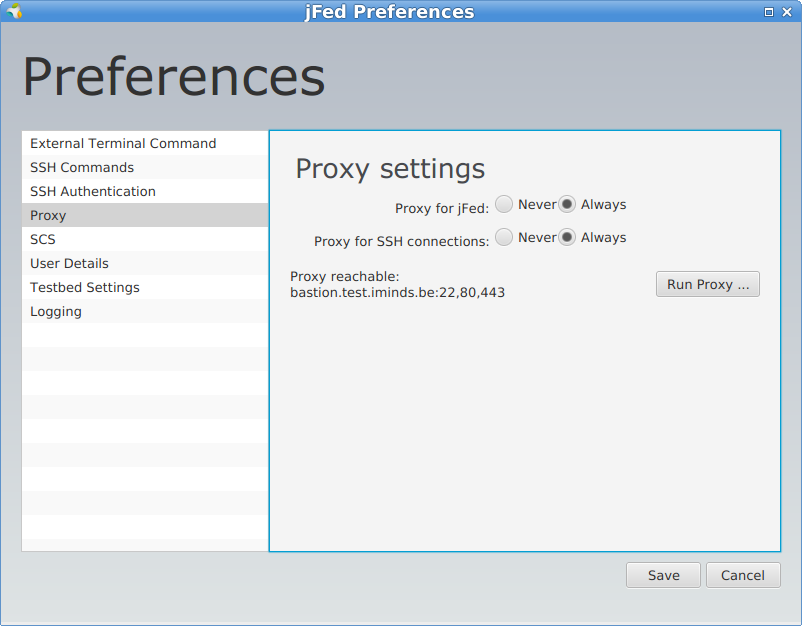Advanced features¶
Introduction¶
This section will show you some advanced features of jFed.
Proxy settings¶
One of the advanced features of jFed is the support of an SSH proxy for the following three problems:
- the APIs of testbeds typically use a lot of exotic TCP ports (12369, 12345, 3636, …). These ports are sometimes blocked by firewalls.
- some testbeds (e.g. Virtual Wall and w-iLab.t) expose the nodes only through IPv6 (because of shortage of public IPv4 addresses). If you are only on an IPv4 network, you cannot reach those nodes without an IPv6 tunnel.
- some nodes (e.g. Virtual Wall windows 7 images, Virtual Wall OpenVZ containers) might have only a private IPv4 address and be accessible only through a gateway (with a public IP address).
For all these cases, jFed has now SSH proxy support which can be enabled for the API calls or/and SSH connections.
This can be enabled by going to the “General” tab, clicking “Preferences” and going to the “Proxy” settings.
The settings are labeled respectively Use Proxy for jFed and Proxy for SSH connections in the screenshot below.
Before you can tick Always you should click first Run Proxy Test.
If you cannot reach the proxy server, it makes no sense to use the proxy.
On windows, it is good to combine this with using the PuTTY SSH agent, this can also be set in the preferences.
Recover slices¶
If you have set up an experiment/slice, and you have terminated jFed, you can click the Recover button to fetch the information of old slices.
In this way you can again see the topology and login on the nodes if they are still up and running.
RSpec editor¶
It is now possible to toggle between a graphical editor and a raw RSpec editor, which makes it possible to add extra information or to put in new RSpecs.
With the Format Code button you can optimise the XML view on the RSpec. With Search or Search & Replace you can enhance your edit. E.g. if you change all component_manager_id`s from
wall2.ilabt.iminds.be to emulab.net, your same experiment will run in Utah Emulab.
Openflow support¶
As we have now a raw RSpec editor, it has become possible to support RSpecs which are difficult to view graphically, e.g. openflow.
If you Open URL and fill in http://jfed.iminds.be/openflow.rspec, an openflow RSpec is loaded for the Virtual Wall openflow testbed and you can further edit it.
jFed supports sending the RSpec to the right Aggregate Manager.
See also http://fed4fire-testbeds.ilabt.iminds.be/ilabt-documentation/openflow.html.
Virtual wall advanced features¶
You can find the specific Virtual Wall advanced RSpecs at Virtual Wall RSpecs which make it possible to load other images, Windows 7, impairment on links, install software, and so on.
Adding extra ssh-keys to nodes¶
By default jFed will add the ssh-key that you specify in preferences, and the public ssh key extracted from your pem certificate.
However if you want to specify extra ssh-keys (e.g. of other users, or from yourself but on another device), you can do so as follows, by adding the following information in the RSpec (just before the closing rspec tag e.g.):
<jfed-ssh-keys:user-ssh-keys user="urn:publicid:IDN+wall2.ilabt.iminds.be+user+wvdemeer">
<jfed-ssh-keys:sshkey>ssh-rsa AAAAB.... wim@tzu</jfed-ssh-keys:sshkey>
</jfed-ssh-keys:user-ssh-keys>
You can repeat both the internal sshkey (this will add multiple ssh-keys to the specified user) or the external user-ssh-keys so
you can specify multiple users.
If you omit the user part, then the ssh-keys will be added to the default user who created the experiment. The user unique identifier (URN)
depends on the authority you use, but for users of the Virtual Wall 2 authority, this always starts with urn:publicid:IDN+wall2.ilabt.iminds.be+user+ followed by your login name.
Caveats:
this is a jFed specific extension to the RSpec (it is interpreted and added as argument in the AM calls), so specify in the rpec header (jFed itself does this already for new experiments, but not if you import an old RSpec):
xmlns:jfed-ssh-keys="http://jfed.iminds.be/rspec/ext/jfed-ssh-keys/1"
you need a jFed compile r1138 or newer (http://jfed.iminds.be/releases/r1338/ : click Experimenter GUI - Launch webstart)
Support for subauthorities¶
When starting an experiment, automatically a list of your subauthorities/projects is shown and you can select one. This information can be used at testbeds to attach policies or quota based policies.
 jFed
jFed